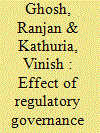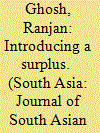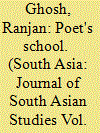| Srl | Item |
| 1 |
ID:
150771


|
|
|
|
|
| Summary/Abstract |
This paper investigates the impact of institutional quality – typified as regulatory governance – on the performance of thermal power plants in India. The Indian power sector was reformed in the early 1990s. However, reforms are effective only as much as the regulators are committed in ensuring that they are implemented. We hypothesize that higher the quality of regulation in a federal Indian state, higher is the efficiency of electric generation utilities. A translog stochastic frontier model is estimated using index of state-level independent regulation as one of the determinants of inefficiency. The dataset comprises a panel of 77 coal-based thermal power plants during the reform period covering over 70% of installed electricity generation capacity. The mean technical efficiency of 76.7% indicates there is wide scope for efficiency improvement in the sector. Results are robust to various model specifications and show that state-level regulators have positively impacted plant performance. Technical efficiency is sensitive to both unbundling of state utilities, and regulatory experience. The policy implication is that further reforms which empower independent regulators will have far reaching impacts on power sector performance.
|
|
|
|
|
|
|
|
|
|
|
|
|
|
|
|
| 2 |
ID:
110857


|
|
|
| 3 |
ID:
110858


|
|
|
|
|
| Publication |
2012.
|
| Summary/Abstract |
This paper looks into the dynamics and performatives of Tagore's school which was established in 1901 at Bolpur in West Bengal. He called it Santiniketan. The paper critiques Tagore's notions of pedagogy in relation to the pregnant network linking the students, teachers and their natural environment; further, it investigates how the school has manifested itself as a green discourse and worked itself out within the dialectic of space and place, giving Tagore's ideas and the pragmatics of execution a fresh circulation of understanding. Here, for the first time, Tagore's ideas on education and nature (eco-pedagogy) are elaborately problematised through the intersections of a variety of thoughts and concepts drawn from contemporary ecocritical studies, ecosophy, discourses on nature, culture, and ethics of humane holism and bioegalitarianism.
|
|
|
|
|
|
|
|
|
|
|
|
|
|
|
|
| 4 |
ID:
136228


|
|
|
|
|
| Summary/Abstract |
The 2003 Indian Electricity Act incentivizes captive power production through open access in an attempt to harness all sources of generation. Yet, we observe that only some firms self-generate while others do not. In this paper we give a transaction cost explanation for such divergent behavior. Using a primary survey of 107 firms from India, we construct a distinct variable to measure the transaction-specificity of electricity use. The ‘make or buy’ decision is then econometrically tested using probit model. Results are highly responsive to transaction-specificity and the likelihood of captive power generation is positively related to it. At the industrial level, this explains why food and chemical firms are more likely to make their own electricity. Since the burden of poor grid supply is highest on smaller sized and high transaction-specific firms, the grid access policies need to account for firm-level characteristics if government wants to incentivize captive power generation.
|
|
|
|
|
|
|
|
|
|
|
|
|
|
|
|